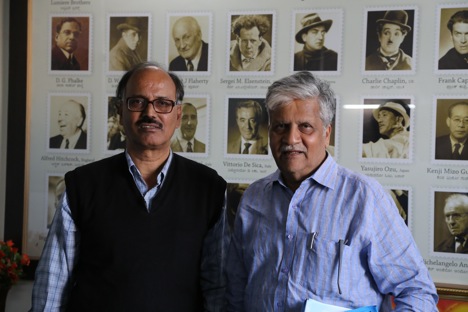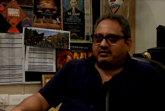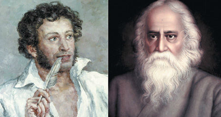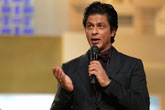Sandalwood is looking for exchanges with Russian cinema

Vidyashankar N Jois (l) and S.V.Rajendra Singh Babu. Source: Alessandro Belli
What is so special about the Bengaluru International Film Festival (BIFFES)?
V.J. It has the same format as any other film festival anywhere in the world but our speciality is bringing out critics’ award films. We have a FIPRESCI (The International Federation of Film Critics) award winners section.
We have similarly NETPAC (Network for Promotion of Asian Cinema) award winners. We showcase the films which have already been tested for quality.
Another thing is that every year we have a theme. This year we had gender violence as a theme. Therefore, we had about six films which only deal with physical violence against women in various parts of the world.
In addition to that, we have a lot of academic activities. We usually pick up a particular parameter of cinema like cinematography, editing or music, and we have a discussion on this. This time we are having a two-day workshop on cinematography. Therefore, we are studying the pioneers of Indian cinema, the cinematographers in the 1940s and 1950s.
This time we are also bringing to the fest a global project on the questions of identity and conflict. This is a project by the German Guitar institute across the world. There are representatives from Sri Lanka, India, Germany and other countries.
Are there any plans to have a broader participation of Russian directors?
V.J. In fact, Russian and Eastern European cinema has been on our radar for some time. Our opening film is a Hungarian film. We are also having a Polish film director Krzysztof Zanussi’s retrospective. We are screening eight films of his, and he is attending the festival. And as for the Russian directors, a Russian picture ‘Test’ by Alexander Kott is a closing film at our festival. Actually, it is premiering in India. No other festival is demonstrating that film.
The Kannada film industry is also very big. Do you plan any exchanges with the Russian cinema in future?
R.S.B. One of my films «Vandana» was screened in Moscow. I visited Moscow Film Festival. The major thing is our Kannada films should go to Russia, Russian films should come to India. A strong bridge has to be built.
Who should support such steps? Government?
R.S.B. This festival is sponsored and run by Government of Karnataka, and our Chief Minister is very friendly towards the film industry. So he has announced many incentives to Kannada films and is already planning to create about 300 theatres. We are losing our theatres because of multiplex. So that is why CM has allocated an amount for building 300 theatres in this year’s budget only for screening Kannada films. It is low cost, today 800-700 is the cost of the ticket but our CM wants it to not exceed Rs 50 to 75.
So is there any chance for new Kannada films to participate in Russian Festival next year?
R.S.B. Yes, I was thinking about an exchange with Moscow Film Festival. We are striving to show Kannada films at Moscow Film Festival and are also inviting Moscow Film Festival Director to bring a package of Russian films to us. Our plan is to enter different regions of Europe or Far East or even Latin America.
Have you already discussed this?
R.S.B. We haven’t discussed this with Russian Festival yet but we have already launched this process. Last year, we had a similar relationship with the German Film Festival. Therefore there is a festival in Hamburg of Kannada films. As I said we are ready to bring a packet of Kannada films to Moscow and also we want to trade with Moscow. Kannada films should go globally and especially to Russia because the sentiments of the Russian audience and our audience in the films are almost the same.
Which genres you think are the best for film festivals in India?
V.J. People always go to see comedies and good cultural films, and the family background movies are very popular. So people will definitely go to see such films and to learn with their help what is happening in other parts of the world.
This is the 7thBIFFES taking place now. How do you see the future of the fest?
R.S.B. We are planning to do it in Mysore, Belgaum, Hubli, all parts of the state. Our aim now is not to be confined to one city because we want the entire Karnataka to know about the film festivals. We want to rotate the fest so that many people will get to know it, and that will give our cultural cooperation a boost.
Do you mean that the festival will have different parts in different cities?
R.S.B. There are two ways to do this. You can have a satellite festival. For example, Pune now has the main festival, and they have a satellite festival in Kolhapur and two more towns around that. But that may not work out for technological reasons. Or we could do it the way we organised Children's Film Festival. We held it in 108 theatres across the state simultaneously. I think it is a world record.
What is the future of the Kannada film industry?
R.S.B. It is growing rapidly. Say, just about five years ago, we used to make only 50 or 60 films. Today, it is 150 films per year.
Do you think this number will increase?
R.S.B. I think it will grow more and more.By doing these kinds of activities, we also want to improve the understanding of the cinema, how Kannada cinema should get into the global scenario. And our main factor, we want to enhance our market outside India as well.
Why do you feel Kannada movies will be popular abroad?
R.S.B. These are family background films. Our culture and lifestyle, our day to day relations are portrayed in these films. Kannada movies focus on depicting human relations, which are universal all over the world.
V.J. I will put it as family aesthetics.
All rights reserved by Rossiyskaya Gazeta.
Subscribe
to our newsletter!
Get the week's best stories straight to your inbox



